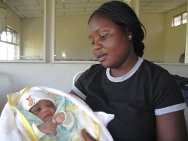Zimbabwe: bringing newborn babies back to life
15-07-2011 Feature
Three to four newborns a week suffer from breathing difficulties and have no heart rate in polyclinics in Zimbabwe's capital of Harare. To survive, these babies need instant warmth while being resuscitated, a medical procedure that can be particularly critical in winter, when the temperature drops.
Overwhelmed with emotion, Linda Moyo* (28), recalls the fear she experienced soon after she gave birth to a baby girl in March 2011 at Mabvuku polyclinic. Her baby was struggling to breathe: "My blood pressure shot up and I went into a state of shock as she was rushed to the baby warmer. The thought of losing my baby was unbearable. After carrying a child for nine months and going into labour for five hours, all you want to do is to hold your baby and treasure the first few moments," she said.
For Jane Sithole* (22), it is a day almost too painful to remember. "I thought she had passed on… the nurses with the help of that machine saved my baby's life," she recalls pointing at the baby warmer. Her baby girl was born in the same month at Mabvuku polyclinic.
A midwife at Mabvuku polyclinic, Sister Nyengerai, explains that the problems babies face immediately after delivery are caused by lack of proper medical attention during pregnancy, a delivery that takes too long, or delays to getting to the hospital or to the next level of care during pregnancy. The heat from the baby warmer increases the baby's chance of surviving because heat revives and improves all systems in the child's body. "Tonight we resuscitated three babies," she says proudly. "We would not have been able to do so without the baby warmer."
The ICRC donated these life saving tools to eleven polyclinics between January and June 2011. "Baby warmers are a prerequisite for every clinic and hospital the world over. This donation will improve the quality of health care in the polyclinics," says Mrs Jenami, the City of Harare District Nursing Officer for Mabvuku. "Bringing baby warmers to polyclinics is part of our ongoing efforts to assist health professionals, especially in high-density suburbs of Harare," notes ICRC Medical Officer, Dr Simbarashe Mabaya.
* Names of these people have been changed to protect their identities
ICRC activities in Harare polyclinics since 2008:
The ICRC provides assistance to 12 polyclinics in the high-density suburbs of Harare, namely Budiriro, Glenview, Hatcliffe, Highfield, Kambuzuma, Kuwadzana, Mabvuku, Mbare, Mufakose, Rujeko, Rutsanana, and Warren Park, each treating an average of 8,000 patients per month.
• Donated essential drugs, basic medical consumables and equipment
• Drilled three boreholes and rehabilitated two others in five polyclinics
• Rehabilitated sanitation infrastructure and installed electricity back up systems in all the polyclinics
• Provided incinerators to eight polyclinics for waste management
• Trained health personnel and support staff at the polyclinics.

